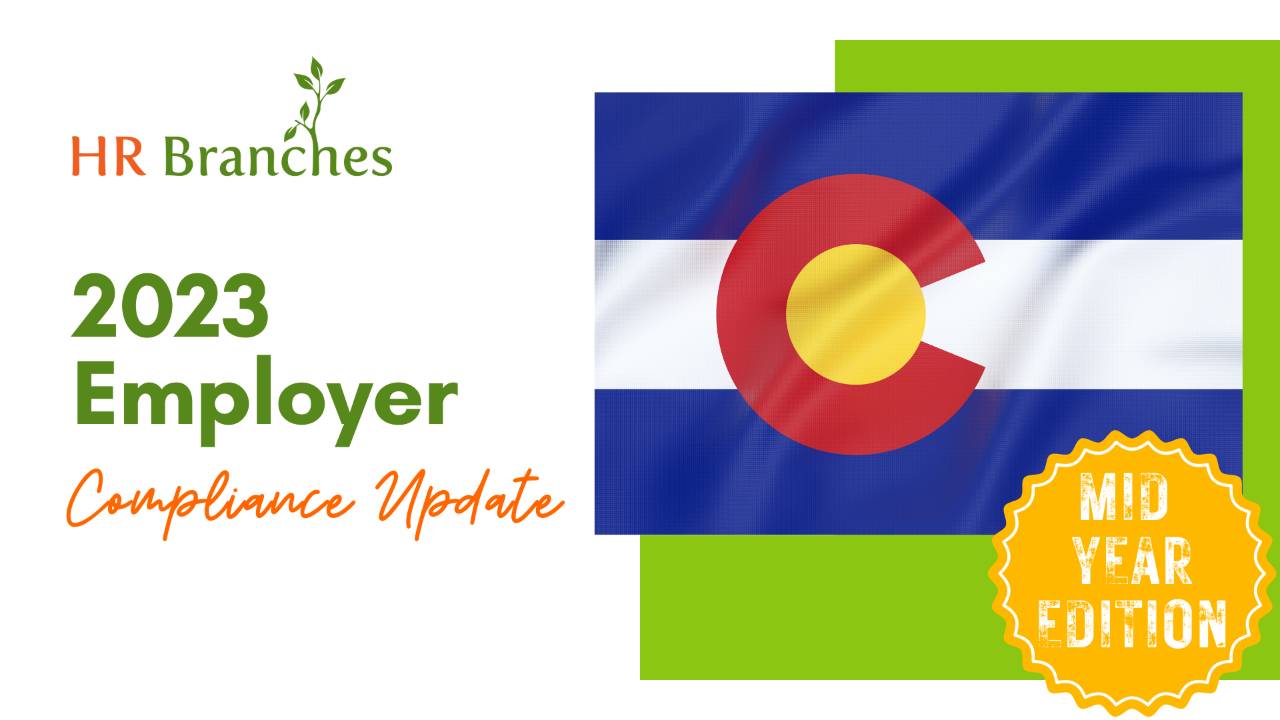2025 Colorado Employment Law Shake-Up: What Small Businesses Need to Know and Do

2025 Colorado Employment Law Shake-Up: What Small Businesses Need to Know and Do
The 2025 legislative session in Colorado delivered what can only be described as a seismic shift for small businesses. With eight major state bills signed into law—and several federal rollbacks implemented under the Trump administration—Colorado employers are now operating in a dramatically different legal landscape.
These changes come with real implications: increased costs (ranging from $3,000 to $50,000+ annually), added administrative burden, and personal risk exposure for business owners. If you own or operate a business in Colorado, it’s time to assess, adapt, and act. Below is a breakdown of the most impactful legislation and what small businesses need to do now to stay compliant and protected.
Personal Liability for Wage Violations (HB25-1001)
Arguably the most dramatic change this year is the introduction of personal liability for wage theft. Under HB25-1001, effective August 6, 2025, any busi...
Navigating Trump’s Immigration Executive Orders: What Small Businesses Need to Know

With the Trump administration ramping up immigration enforcement, small businesses must be proactive in ensuring compliance with Form I-9 and E-Verify. This blog breaks down the impact of recent executive orders, best practices for maintaining compliant employment records, and how to prepare for potential ICE audits or workplace raids. We also touch on why H-1B and J-1 visa holders are not the primary focus of these policies. Stay informed, protect your business, and navigate these evolving regulations with confidence. This is not legal advice—consult a professional for specific guidance.
As the Trump administration rolls out new executive orders on immigration, small businesses find themselves at the intersection of compliance and enforcement. Historically, employers have played a critical role in controlling immigration within the U.S. by verifying the legal work status of employees through Form I-9 and E-Verify. With heightened enforcement measures, now is the time for businesse...
Trump’s Executive Orders on DEI: What Small Businesses Need to Know

Trump’s Executive Orders on DEI: What Small Businesses Need to Know
The recent executive orders issued by President Trump regarding Diversity, Equity, and Inclusion (DEI) programs have sparked significant discussion across industries, including among small business owners. These orders seek to reshape workplace policies by emphasizing merit-based hiring and eliminating what the administration identifies as potential discriminatory practices associated with DEI initiatives.
What the Executive Orders Say
The Trump administration has framed these executive orders as a means to reinforce workplace fairness and opportunity by focusing on hard work, merit, and equality. According to the administration, DEI programs—when implemented improperly—can create division rather than unity and may contribute to workplace discrimination rather than eliminating it. The administration has explicitly stated its intent to strengthen the workplace by ensuring that civil rights laws are properly enforced ...
End-of-Year HR Prep: What Business Owners Need to Know

As the year wraps up, business owners have plenty on their plates—from closing out financials to planning for the year ahead. But one area that shouldn’t be overlooked is end-of-year HR preparation. Taking a few key steps now can help set up your business and employees for a smooth and successful start to the new year. Here’s your checklist to make sure you’re covering all your HR bases.
1. Update Your Employee Handbook
The end of the year is the perfect time to review and update your employee handbook. Policies may need adjustments to reflect changes in labor laws, benefits, or company standards. Reviewing your handbook annually helps ensure it’s accurate, compliant, and ready for distribution. Once updated, be sure to have a lawyer, who specializes in employment laws, review for legal compliance and then share the handbook with employees and have them acknowledge any new changes.
2. Prepare Payroll for the New Year
Get payroll in order to avoid hiccups in the new year. Confirm th...
The Case for Targeted NDAs: Protecting Your Small Business Without Overstepping

In the world of Human Resources, particularly within small businesses, one of the more common yet often misunderstood tools is the Non-Disclosure Agreement (NDA). NDAs are essential for protecting sensitive business information, but there's a growing conversation about how—and to whom—they should be applied.
Many small business owners, in an effort to protect their companies, may feel compelled to have every employee sign an NDA. However, applying NDAs too broadly can lead to unintended consequences, including legal risks, decreased employee morale, and the potential violation of workers' rights. This blog will explore why NDAs should be executed only by those with access to true confidential information, and how Human Resources professionals can guide small businesses in making informed decisions about the use of these agreements.
Understanding the Purpose of NDAs in Small Business
The primary function of an NDA is to protect confidential information from being disclosed outside th...
Unlocking the Mysteries of Employee Classification

Why Employee Classification Rocks
Employee classification isn't just about ticking boxes – it's about ensuring everyone's on the right track and playing by the rules. Think of it as the backbone of our company's operations, keeping us in sync with legal requirements and ensuring fairness across the board.
Employee classification is a critical aspect of HR management that ensures employees are properly categorized based on their job duties, responsibilities, and employment status. Accurate classification helps protect both the company and its employees by ensuring compliance with labor laws, taxation regulations, and other legal requirements. It's vital that everyone involved in the hiring and management process understands the importance of accurate classification and its implications.
1099 vs. Employee
We've all heard about the perks of being a contractor, but do you know the difference between a 1099 contractor and a full-fledged employee? Understanding this is crucial to ens...
Understanding Colorado’s Exempt vs. Non-Exempt Classifications

Employee classification is a crucial aspect of ensuring fair labor practices and compliance with state and federal laws. In the state of Colorado, employers must understand the distinctions between exempt and non-exempt employees to properly manage work hours, breaks, overtime, compensation, benefits, and FLSA compliance. This blog aims to provide a comprehensive overview of the state's exempt vs. non-exempt classifications to help employers navigate these important distinctions.
1. Scheduled Work Time:
Exempt employees are not required to track their work hours and are expected to work as many hours as necessary to complete their job duties efficiently. On the other hand, non-exempt employees typically have set schedules or specific hours they are required to work, usually within a standard workweek of 40 hours.
2. Breaks:
Exempt employees have more flexibility regarding breaks as they are not entitled to mandatory rest or meal breaks under federal law (although some state laws may re...
Colorado Employer Compliance Update

We've been anticipating another mid-year compliance update as this seems to be the norm for Colorado legislation now. We aim to keep the small business community informed of changes to the employment law landscape that directly impacts you. It's a long one so join us for the journey and we'll walk you through what you need to know!
Mid-Year Compliance Update Summary
Now
- CO Military Leave Clarification
- FED Pregnant Workers Fairness Act
- CO Unemployment Insurance Premiums
Soon
- CO Protecting Opportunities and Workers Rights (POWR) 8/7/2023
- CO Bereavement Leave Through HFWA 8/7/2023
- CO Workers Comp Updates 8/7/2023
Later
- CO FAMLI Benefit Calculation Update 1/1/2024
- CO Equal Pay For Equal Work Act 1/1/2024
- CO Application Question Restrictions 7/1/2024
NOW
Military Leave Clarification
HB 23-1045 This is an expansion from the already required USERRA Military Leave. CO private and public employers are required to provide a leave of absence for ...
Masks & Your Business: Colorado Mask Order

On Thursday, July 16, 2020, Governor Jared Polis implemented a 30-day statewide mask order in the state of Colorado (there is a possibility of extension). This order impacts every way we conduct business, work with our employees and serve your customers. There are a number of considerations that you need to apply when staying compliant. Read on to learn how to apply this order to your business operations.
There is significant debate about the mask order and deep-rooted feelings for and against this order. As you maneuver through implementing and staying compliant with this order, you will encounter these perspectives. No matter what your personal thoughts are, it is important to know what is expected of you as a business owner. Without further ado, let's dive right in.
Your Working Environment:
Within the Colorado mask order, you do have to be mindful of when your staff must wear a mask. You and your team are required to wear a mask when:
- Working with the public
- Enterin ...
LAW UPDATE: Families First Coronavirus Response Act
3/26 Update:
We now have a workplace poster about the FFCRA (Families First Coronavirus Response Act) and employee rights in regards to paid sick leave and the expanded family and medical leave.
This will need to be posted with the rest of your employment posters in a common area by April 1st. There has no been specific guidance on methods to notify your remote workers but we suspect there will be soon. We will keep you updated, however, have a plan in place to provide this to remote workers such as email, posting to a payroll portal where employees regularly log in, or printing and mailing.
If you have already laid off some of your workforce, there’s no need to alert them.
FFCRA Workplace Post (Non-Federal)
The U.S. Department of Labor sent out a bulletin about 30 days of non-enforcement between March 18 and April 17, 2020 as long as employers act reasonably and in good faith to comply with the FFCRA. One thing to note is this does not protect you from lawsuits or willful viol...


